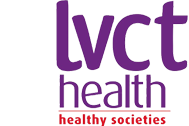I am Joseph Baraza, a trained counsellor, a person with a hearing impairment and work at LVCT Health drop-in center in Nairobi’s central business district. I understand the way of life of people with disabilities and their challenges in accessing health care, including physical, communication and attitudinal barriers. Cases of Gender based violence have been on the increase during the COVID-19 pandemic. People who are living with a disability are particularly vulnerable to both the novel coronavirus and gender-based violence.
Recently, a couple whom I have been counselling for some time came for a routine visit to the clinic. This time, they told me that they were having family disputes. This was new in their relationship, something they’d never mentioned before. I got concerned since they are a discordant couple (one living with HIV and one being HIV-negative). They had been faithfully attending their clinic appointments and were taking their medication consistently.
The husband narrated that he had been the breadwinner but lost his job due to the COVID-19 pandemic. He was frustrated as he was no longer able to support the family. This situation created tension in the house since they were unable to feed their three children and pay their bills. The financial stress and tensions resulted in emotional violence. The violence, in return, was threatening their relationship. They were also deeply concerned about their teenage daughter who had to start looking for money and was at risk of sexual abuse.
After listening to them keenly, I provided the essential psychosocial support and educate them on the current situation of the COVID-19 pandemic. Our lengthy discussion helped them realize that they needed each other now more than ever. They agreed to look for alternative ways of earning a living. The woman would look for some casual jobs like washing clothes while the husband would follow-up on the funds that had been disbursed by the government to support the vulnerable during this pandemic.
The hardship that my client couple face has been common. Job losses caused by the measures put in place to contain the COVID-19 pandemic affected people living with disabilities highly. This has exposed them to financial and emotional stress, and all forms of violence. It makes me sad that nearly half of my clients with disabilities reported distress due to this pandemic. Some reported physical, emotional and sexual abuse. Violence affected their treatment and their relationships with their partners and families. I am worried that we may reverse some of the gains achieved in containing HIV and other sexually transmitted diseases amongst the deaf community.
During the COVID-19 pandemic, I do not limit my work to HIV and gender-based violence. I also educate all my clients, including my client couple, about the current situation of the COVID-19 pandemic. I inform them about the preventive measures that they needed to follow as a vulnerable group who should be extra careful. I recorded videos in Kenyan sign language to inform the wider deaf community about COVID-19 is, how it is spread and how to keep safe. I realized that not only my client couple needed to be united, also we people in the deaf community need each other now more than ever. The ARISE, a consortium that LVCT Health works with, recently documented and published my work with people with disabilities in a photo story.
GBV and SRH services need to be inclusive towards PWDs, all prevention and response measures need to maximize the reach of the PWDs in the society to ensure they receive these essential services and information is accessible to them. Their needs should not be overlooked. At LVCT Health, we provide a comprehensive range of HIV, Gender-Based Violence (GBV) and Sexual and Reproductive Health (SRH) services for the deaf using Kenyan Sign Language and for the Visually Impaired Persons (VIPs) using Braille and typing services, among others. Over time, we have sensitized service providers on the health needs of the deaf and blind to address their HIV, GBV, SRH concerns; Over time, we have sensitized service providers on the health needs of the deaf and blind to address their HIV, GBV, and SRH concerns.
